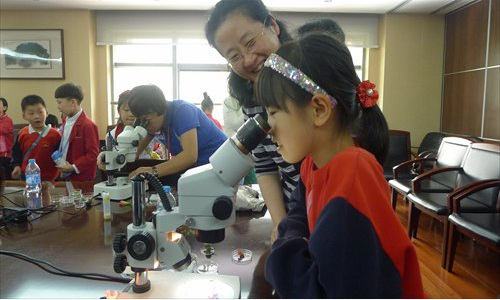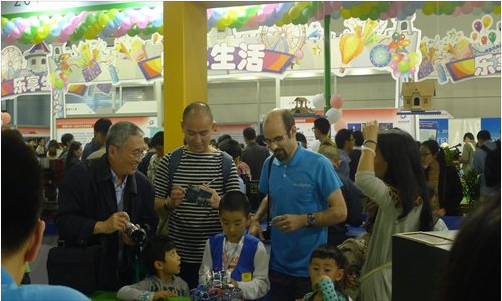
On Tuesday the Shanghai Institute of Biochemistry and Cell Biology (SIBCB) had rarely been so lively. The sound of children's voices echoed throughout the institute which is attached to the Shanghai Institutes for Biological Sciences (SIBS) and the Chinese Academy of Sciences (CAS). More than 100 children from the Shanghai Wannan Road Kindergarten straggled into the hallways, meeting rooms and laboratories of the institute as part of National Science and Technology Week.
 |
| Kindergarten student Wu Yuanqing looks at part of a flower under a microscope. Photo: Wang Zhefeng/GT |
As well as major exhibitions at the Shanghai Convention & Exhibition Center of International Sourcing, in the city 91 scientific institutions and laboratories were open to the public, including several key laboratories like the State laboratory of molecular biology and cell biology at the SIBCB.
For little Wu Yuanqing looking at part of a flower under a microscope was a dazzling experience. "I saw this brilliant mix of yellow and red things. They were the pistils of a flower." The kindergarten student had never been to a laboratory before and had never looked into a microscope. "Everything seems so big!"
Her classmate Zhou Shengyang was standing right beside her and was getting impatient waiting for his turn. He had brought his own specimen to examine under the microscope. Although the laboratory had arranged a selection of things to look at under the microscopes, little Zhou had brought a leaf from home. "I want to know about my own plant," he insisted.
First contact
Wang Qiong is the laboratory manager who helped guide the children as they made their first contact with real science. "Usually girls are interested in looking at flowers and boys like to look at insects. They all enjoy seeing these other worlds through microscopes."
The institute had laid on a range of events and activities for the visitors. After a welcoming address and a chat about hygiene the children were taken to a room where they could look at different plants and insects under microscopes. Then they were shown through some of the laboratories where scientists were working.
"We don't clean anything up - the laboratories are just the same as they always are," said Song Jinfang, the institute's office manager. The children were seeing real scientists at work carrying out experiments and using robotics to help.
"We first opened our laboratories for the children of the staff here," Song said. "Sometimes children boast about their parents working for the science academy. But they really don't have a clue as to what the parents really do. A few years ago we began opening the laboratories up for Children's Day to show the kids what their parents did and now we have expanded that program."
Another laboratory manager, Huang Yanping, told the Global Times the institute had played host to a variety of young people. "Today we have kindergarten children and last Friday, we invited some grade one students from the Shanghai Nan Yang Model High School. These two groups were specially organized for science week but at other times we also open the laboratories for students who are interested in science and research."
The country pours a great deal of money into the key State laboratories and the Ministry of Science and Technology insists that the public has some access to them. "The ministry wants to ensure that people can see and understand what they are investing in," Song explained.
 |
| Rudoleo Cossovich (in blue) helps a young visitor try out one of the robots made by his company. Photo: Wang Zhefeng/GT |
Different approaches
Not all institutes have the same approach to science week open days and some have had to learn to adopt their open days so that they are acceptable for the general public.
Professor Liao Kan is the assistant to the dean of SIBS, and when he was in Beijing two years ago he attended at an open day event at another institution. For that open day, he remembers that the scientists had worked hard, prepared a number of exhibits and invited a lot of people. But it went wrong because the scientists had overestimated the level of understanding that then public had of their work. Even Liao himself, a scientist, struggled to grasp some of the concepts.
Liao had 10 years experience in research in American laboratories and said that in the West it was common to open up research institutes and laboratories to the public. Most of the scientists now working at SIBS have had overseas experience and they have discussed how to open the institute effectively for the public.
Liao believes open days are a way of popularizing science and the key is in communication, so that ordinary people can learn what the scientists are doing. The best way to start is from the public's point of view, not letting scientists decide what is important and then making their work seem impenetrable.
As a scientist with 10 years experience working to make science popular, Liao said scientists have to use different styles and techniques for different audiences. For kindergarten children he explains how white and red blood cells battle bacteria; for senior high school students he explains Darwin's Theory of Evolution; and for groups of elderly people he talks about food and health issues.
While he doesn't believe that all scientists have to popularize their work, he suggests that some 5 percent of the country's scientists should be involved in this. "Sometimes only the scientists actually involved in the research really understand the principles and know how to express it appropriately and not mislead people."
Liao agreed there were some scientists who were excellent at their research but not good at communicating. However there were also some scientists who were communicative and could express complicated theories clearly and colorfully.
Not a chore
"We have to find these people and let them work on ways to popularize science." Liao undertakes five or six special popular science projects every year. This was not a chore, he said - he thought of it as his responsibility.
Professor Wang Enduo is a highly regarded senior member of CAS. As a leading biochemist and molecular biologist, the 70-year-old still delivers public lectures and works with students on various projects. Her big hope is that her successors will carry on and advance scientific literacy for all Chinese.
She recalled a moment on a visit to Canada when some middle-aged ordinary housewives were talking to her and they asked what she did. Wang told them she worked in molecular biology and they immediately understood that she worked on DNA.
"That's scientific literacy! Ordinary people know about science. This is what we are lacking in China."
Wang talked about the Zhang Wuben, the notorious pseudo-nutritionist who sold millions of books based on fake diet principles. "Why were people so easily conned by this man? - Because people were concerned about their health but didn't have the scientific literacy to realize he was cheating them."
Starting young
Zeng Zhihong is a grade two student at the No.1 Primary School affiliated to Shanghai Normal University in Jing'an district. The 8-year-old went to the Shanghai Convention & Exhibition Center of International Sourcing with his father and learned about firsthand earthquake prevention, astronauts and photoelectric reactions. "Monday is our school's science fair and we will have some events but here we get an allover view."
Zeng's father is also a science enthusiast and although he now works in finance he hopes his son will appreciate science. "Science and technology are closely related to daily life and they change our daily lives. Today's children watch television or play with iPads and don't do many practical things. I wish they could have wider experiences."
Rudoleo Cossovich comes from Argentina and his company, which specializes in robotics, was exhibiting at the center. "This is a great opportunity to see what is going on here and show what we are doing. As you can see the Shanghai children and some of their parents are completely involved in our games." (Global Times)

86-10-68597521 (day)
86-10-68597289 (night)

86-10-68511095 (day)
86-10-68512458 (night)

cas_en@cas.cn

52 Sanlihe Rd., Xicheng District,
Beijing, China (100864)

